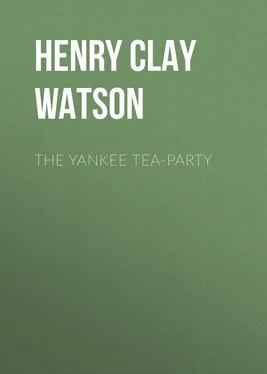Henry Clay Watson - The Yankee Tea-party
Здесь есть возможность читать онлайн «Henry Clay Watson - The Yankee Tea-party» — ознакомительный отрывок электронной книги совершенно бесплатно, а после прочтения отрывка купить полную версию. В некоторых случаях можно слушать аудио, скачать через торрент в формате fb2 и присутствует краткое содержание. Жанр: foreign_prose, История, foreign_edu, foreign_antique, на английском языке. Описание произведения, (предисловие) а так же отзывы посетителей доступны на портале библиотеки ЛибКат.
- Название:The Yankee Tea-party
- Автор:
- Жанр:
- Год:неизвестен
- ISBN:нет данных
- Рейтинг книги:5 / 5. Голосов: 1
-
Избранное:Добавить в избранное
- Отзывы:
-
Ваша оценка:
- 100
- 1
- 2
- 3
- 4
- 5
The Yankee Tea-party: краткое содержание, описание и аннотация
Предлагаем к чтению аннотацию, описание, краткое содержание или предисловие (зависит от того, что написал сам автор книги «The Yankee Tea-party»). Если вы не нашли необходимую информацию о книге — напишите в комментариях, мы постараемся отыскать её.
The Yankee Tea-party — читать онлайн ознакомительный отрывок
Ниже представлен текст книги, разбитый по страницам. Система сохранения места последней прочитанной страницы, позволяет с удобством читать онлайн бесплатно книгу «The Yankee Tea-party», без необходимости каждый раз заново искать на чём Вы остановились. Поставьте закладку, и сможете в любой момент перейти на страницу, на которой закончили чтение.
Интервал:
Закладка:
"More ale," called out Hand, and more ale was brought; and then Hand proposed as a toast—"The memory of the men who fell on the 19th of April, 1775." This was drank standing, and a short pause ensued.
FIFER'S STORY
"Now," said Kinnison, "I expect that some of you men who know something about them times shall keep your promise of following my story."
"I'll tell you a story," replied Brown, the fifer. "P'raps some of you won't swallow it; but it's all fact, and that you'll find if you choose to hunt for the papers. It's chiefly about me and my fife, and Hanson and his drum."
"Pipe away, Brown," said Kinnison.
"Well, you see," began Brown, "Hanson and I were drummer and fifer in Colonel Brooks' regiment, at Saratoga, and we were in the battle of Stillwater, fought on the nineteenth of September. I'm not going to 'spin a yarn,' as the sailors say, in the way of an account of that battle, for that has been said and sung often enough. It is sufficient for me to say, that it was the hardest fought, and the bloodiest battle that ever I saw, and Hans n and I were in the thickest of it, where the bullets were hailing. Our regiment suffered a good deal in the way of losing men, and I saw many an old friend fall near me. But at dusk, when most of the Americans were ordered to camp, I and Hanson were unhurt. Colonel Brooks kept the field when the other officers retired with their forces. Some of the men of his regiment were tired and grumbled, but he wanted to show the enemy that they had gained no advantage over us, and that our spirits were as strong as when the day's work commenced. This conduct you might have expected from what you have heard of Brooks' character. He was all game—Brooks was. One of those whip or die men, that are not to be found everywhere. Well, as I said, our regiment remained on the field, and finally got into a skirmish with some of the German riflemen. We knew they were German riflemen by the brass match-cases on their breasts. In this skirmish, a ball struck me on the hand, went through it, and knocked my fife clear away beyond our flank. Well, I couldn't part with my Yankee Doodle pipe in that way, without trying to get hold of it again. So I told Hanson, and he put down his drum, and proposed that we should go and get it; and we did go out together, while the balls were whizzing round our ears, and got the pipe."
"Hold on, Brown," interrupted Kinnison. "Wasn't it a dark night?"
"Yes," replied Brown; "but we saw where the fife lay, by the quick flashes of the guns. Didn't we, Hanson?"
"Yes; it's a fact," replied the drummer; "and when we returned, I found a couple of balls had passed through the heads of my drum."
"I told you I thought you wouldn't swallow it," observed Brown; "but here's the fife, and here's the mark where the ball passed through my hand." Brown exhibited the scar, and doubt seemed to be set at rest. Kinnison, however, shook his head, as if unsatisfied.
"There wasn't a great deal in the mere going after the fife at such a time," continued the fifer, "but I thought I'd mention it, to give you an idea of Hanson's spirit."
"Very well," remarked Hand, "we are satisfied now that both Mr. Brown and Mr. Hanson are really men of spirit."
ARNOLD'S EXPEDITION
"Mr. Davenport," said one of the young men, "won't you entertain us with an account of something you saw or joined in, or did yourself, during the war?"
"Were any of you at Quebec, with Arnold and Montgomery?" inquired one of the veterans who had been an attentive and silent listener to the preceding narratives.
"I accompanied Colonel Arnold on the expedition up the Kennebec," replied Davenport.
"Then tell us about it, won't you?" eagerly exclaimed one of the young men.
"Ay, Davenport, tell us about it," added Kinnison. "I've never heard anything I could depend on about that march through the wilderness. Old Joe Weston tried to give me an account of it; but his memory was very weak, and he hadn't the knack of talking so that a person could understand him."
"Well, you see," began Davenport, "I was livin' up here on the Lexington road, when I hear that General Washington had planned an expedition to Canada by way of the Kennebec and the wilderness north of it, and that Colonel Arnold had been appointed to command the troops who were to undertake it. I was preparing to join the army at Cambridge; but I thought that Arnold's expedition would suit me better than staying in camp around Boston. So I furnished myself with many little knick-nacks, shouldered my musket, and started off to offer my services. They placed me in one of the companies of Major Bigelow's battalion. I believe there was about eleven hundred men, in all, under Arnold's command, who marched from Cambridge to Newburyport. There we embarked on board of eleven transports, and, on the nineteenth of September, sailed for the Kennebec. I must confess, I didn't like the idea of starting so late in the year, because I knew we'd meet with some of the coldest kind of weather before we reached Canada; but I had to be satisfied. At the end of two days, we had entered the Kennebec and reached the town of Gardiner. The only accident we had met with was the grounding of two of our transports; but we got them off without much difficulty. I forgot to mention, however, that two hundred carpenters had been sent up the river, before we started from Cambridge, with orders to build two hundred batteaux at Pittston, opposite Gardiner. Well, when we arrived at that place, we found the batteaux ready, and immediately transferred our baggage and provisions to them, and pushed up the river to Fort Western. At that place our real work was to commence. Colonel Arnold knew a great deal about the route, and he had undertaken it because he knew what he had to encounter, and how much glory he would win if he succeeded; but we men, who were to work and suffer most, knew nothing about the route; except that it was through a wilderness where few white men had set foot. Before the army started from Fort Western, two small parties were sent forward to survey and reconnoitre the route as far as Lake Megantic and the Dead River. Next, the army began to move in four divisions. Morgan and his riflemen went first; next day, Green and Bigelow, with three companies; next day, Meigs, with four companies; and the next day, Colonel Enos, with the three other companies. You see, the divisions started a day apart, so as to prevent any difficulty in passing rapids and falls. Colonel Arnold waited to see all the troops embarked, and then passed the whole line till he overtook Morgan. On the fourth day after our party—that is, Green and Bigelow's—started from Fort Western, we arrived at Norridgewock Falls. You may recollect, there used to be a tribe of Indians called the Norridgewocks, who had a village near these falls. I saw the plain where the village stood, and the ruins of the church which was destroyed by Captain Moulton during the war with the tribe. At the falls, all the batteaux had to be taken out of the river and transported a mile and a quarter by land. You may suppose, there was some work about that part of the journey. The banks on each side of the river were very rugged and rocky; and we had to carry the greater part of our baggage on our backs. One half of the party helped the oxen to draw the boats up to the place where they were to be put into the water again. We found some of the boats were leaky, and a great deal of the provisions damaged, which was a matter of importance, as you will see when I get farther on in my story. We were seven days in passing round that fall and repairing our boats. During those seven days, we worked as I had never seen men work before; and, strangely enough, there were very few grumblers in our party. We joked and sang lively songs, even during the hardest labor; and I got into a much better humor than I was in when I started. We had an Irishman, named Jim O'Brien, in our mess, who was one of the best hearted and quickest-witted chaps I ever encountered; and we had a friend of his, named Murtough Johnson, who was as dull and blundering as O'Brien was keen and ready. So, you see, with O'Brien's jokes and Johnson's blunders we had something to amuse us. I recollect, at one time, we were pushing our boat up on the bank clear of the water, and Johnson handled his pole so clumsily that he fell into the river. O'Brien hauled him out after he had a severe ducking in rather cold water. The officers worked as hard as the men. Every sinew and muscle was brought into use. Colonel Arnold seemed to be ever active, cheering on the men, and often lending his hand to aid them."
Читать дальшеИнтервал:
Закладка:
Похожие книги на «The Yankee Tea-party»
Представляем Вашему вниманию похожие книги на «The Yankee Tea-party» списком для выбора. Мы отобрали схожую по названию и смыслу литературу в надежде предоставить читателям больше вариантов отыскать новые, интересные, ещё непрочитанные произведения.
Обсуждение, отзывы о книге «The Yankee Tea-party» и просто собственные мнения читателей. Оставьте ваши комментарии, напишите, что Вы думаете о произведении, его смысле или главных героях. Укажите что конкретно понравилось, а что нет, и почему Вы так считаете.












